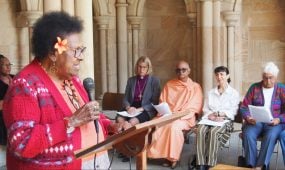The potential Oxford vaccine and the transforming love of God
Reflections
The Rev’d Dr Cathy Laufer provides her thoughts on current discussions about a potential COVID-19 vaccine

Various church leaders in Sydney have written to the Prime Minister expressing concern about the ethics of accepting the potential Oxford vaccine, should it prove successful against COVID-19. This concern is based on the use of cellular material that can be traced back to a foetus electively aborted in 1973, which is a common practice in medical research. Anglican Archbishop Glenn Davies told ABC’s AM programme, “to use that tissue for science is reprehensible”. Meanwhile, Catholic Archbishop Anthony Fisher, in an interview with ABC Radio’s Religion and Ethics Report, said he believes it would be ethical for a person to accept the vaccine if there was no alternative. However, he added that he feels many people would be “troubled” because they could feel “complicit” in the abortion.
Advertisement
I understand the Archbishops’ desire to address the possible crisis of conscience for some people of faith. However, in my opinion they have missed the theological crux of the matter.
An analogy. A child is killed by a drunk driver and the parents donate the child’s organs. That child was ‘innocent’, died involuntarily, and as a minor could not give consent to organ donation. Do we refuse the organs? Certainly not! Through organ donation, other people can live because of the child’s death. That does not deny the sinfulness of the driver’s act, nor the pain and suffering of the child and parents. However, it can bring some level of meaning to a tragedy. In Gospel terms, that child has, involuntarily, been the Christ figure for those who receive the organs.
To the current issue. Yes, a foetus was aborted – decades ago. We do not know the circumstances, but we can say that the foetus was ‘innocent’ and did not give consent to the use of their tissue. But, through its use and the development of the cell line, countless lives have already been saved, including through the rubella vaccine of which there remains no alternative, as noted by Archbishop Fisher in his ABC Radio interview. Surely the Christian response is to see this in the context of Christ’s death. The act of those who crucified Christ was wrong, but the result was and is life for countless millions. That is our faith.
Advertisement
The analogy is far from perfect. Christ died with knowledge, voluntarily giving his life. Neither my hypothetical child nor the aborted foetus had knowledge of impending death or the ability to give consent to the use of their bodies by others. However, that abortion has already occurred. We cannot give that foetus the life that was lost. Instead, we have a choice. We can either leave that abortion as a sinful tragedy or we can allow God to transform it into a life-giving one.
Refusing the Oxford vaccine, should it prove effective, is to allow sin, evil and death to triumph. Let us, instead, let God do what God does best – shine light in the darkness, bring good out of evil, turn death into life. Let us accept the vaccine as a product of both the God-given ingenuity of human beings, and God’s own transforming love. And let us give thanks.
Editor’s note 31 August 2020: anglican focus acknowledges that this is a complex matter and that there will likely be a range of views in our Diocesan community about this issue.
Editor’s note 9 September 2020: The AstraZeneca-University of Oxford late-stage vaccine trial was “voluntarily paused” on 9 September 2020 after a study participant suffered a “potentially unexplained illness”.





